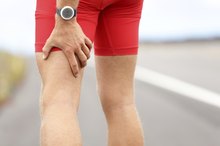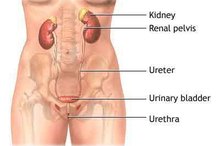Signs of a Pulled Chest Muscle
Chest pain can cause you to fear the worst, so it makes sense that it's one of the most common reasons people visit their doctors. But more often than not, the cause of chest pain is musculoskeletal and benign.
Sports activities and weightlifting — especially when deconditioned or not properly warmed up — are common causes of pulled chest muscles. If you feel sore, have localized swelling or bruising, decreased mobility and muscle spasms you may have pulled a chest muscle. Always confirm the cause of pain before deciding how you will treat it.
Tenderness and Stiffness
Chest pain caused by a pulled muscle is the result of trauma that can occur several days before the pain appears. Consider any activities you have done recently that might result in a pulled muscle. Injury from direct trauma can cause tenderness of the chest wall muscles. You will notice tenderness when pressing on the area with your fingers.
Depending on the severity of the strain, you may experience a loss of mobility. You may not be able to open your arm out to the side or raise it above your head. Once swelling has subsided, this should improve. You can begin to gently stretch the chest muscles once you no longer feel pain.
Read more: How to Heal a Muscle Strain
- Chest pain caused by a pulled muscle is the result of trauma that can occur several days before the pain appears.
- You can begin to gently stretch the chest muscles once you no longer feel pain.
Pain and Weakness
Hyperextension of the Calf
Learn More
Chest muscles are pulled and strained in varying degrees. The mildest pulled muscle injury yields few tears and little weakness. A moderate injury results in more tears to the chest muscles, and loss of strength and mobility. The most severe injury causes the muscle to rupture, potentially requiring surgery and other medical interventions.
The most obvious sign of a pulled muscle is pain. However, the level of pain relates to the degree of injury. With a muscle strain, pain can be felt when stretching, lifting, reaching or exerting the affected chest muscles. A moderate or severe strain will also result in weakness, due to a muscle tear.
Ice and over-the-counter pain relief medications can be used to control pain and tenderness associated with mild to moderate muscle strains. If your pain is more severe, contact your doctor.
- Chest muscles are pulled and strained in varying degrees.
- A moderate injury results in more tears to the chest muscles, and loss of strength and mobility.
Muscle Spasms, Swelling and Bruising
A pulled muscle can also cause swelling in the chest area and muscle spasms. A muscle spasm is the result of inflammation caused by strain, causing the muscles to contract suddenly. Pain may also be present with muscle spasms. Localized bruising may also appear.
To relieve swelling, ice can be applied immediately after injury, but should be limited to 20-minute applications. You can reapply the ice treatment every few hours.
Read more: How to Tell If You Pulled a Muscle
- A pulled muscle can also cause swelling in the chest area and muscle spasms.
- Pain may also be present with muscle spasms.
Related Articles
References
- HealthLine: What You Should Know About a Pulled Chest Muscle
- Primary Care: Evaluation and Treatment of Musculoskeletal Chest Pain
- Hospital for Special Surgery, "Muscle Strain: What You Need to Know About Pulled Muscles."Nov.2019
- Kary JM. Diagnosis and management of quadriceps strains and contusions. Curr Rev Musculoskelet Med. 2010;3(1-4):26–31. doi:10.1007/s12178-010-9064-5
- Levine WN, Bergfeld JA, Tessendorf W, Moorman CT. Intramuscular corticosteroid injection for hamstring injuries. A 13-year experience in the National Football League. Am J Sports Med. 2000;28(3):297-300. doi:10.1177/03635465000280030301
- Ranatunga KW. Temperature effects on force and actin⁻myosin interaction in muscle: A look back on some experimental findings. Int J Mol Sci. 2018;19(5):1538. doi:10.3390/ijms19051538
- Schmitt B, Tim T, McHugh M. Hamstring injury rehabilitation and prevention of reinjury using lengthened state eccentric training: A new concept. Int J Sports Phys Ther. 2012;7(3):333–341. PMID:22666648
- Mair SD, Seaber AV, Glisson RR, Garrett WE. The role of fatigue in susceptibility to acute muscle strain injury. Am J Sports Med. 1996;24(2):137-43. doi:10.1177/036354659602400203
- Noonan TJ, and Garrett WE, "Muscle Strain Injury: Diagnosis and Treatment" J. Am. Acad. Ortho. Surg., Jul 1999; 7: 262 - 269.
Writer Bio
A health-care professional for more than 10 years, Rica Lewis has obtained numerous certifications in the industry. In 2006 she began channeling her knowledge into health-related articles for print and online publications. Her work has appeared in "Metroparent Magazine," "Anew Heart Healthcare Magazine" and community newspapers. Lewis earned a diploma from LongRidge Writers Institute.







